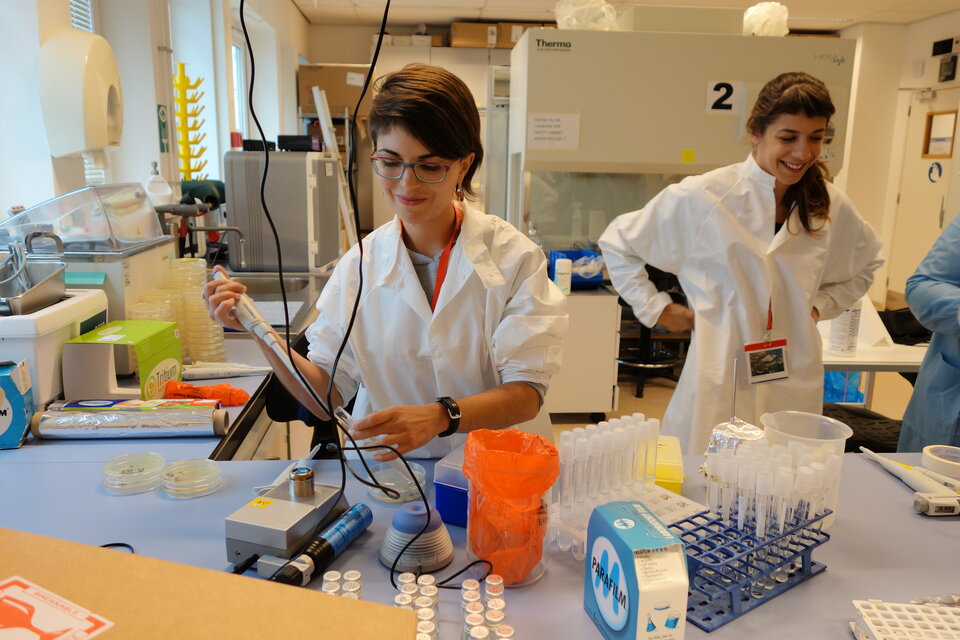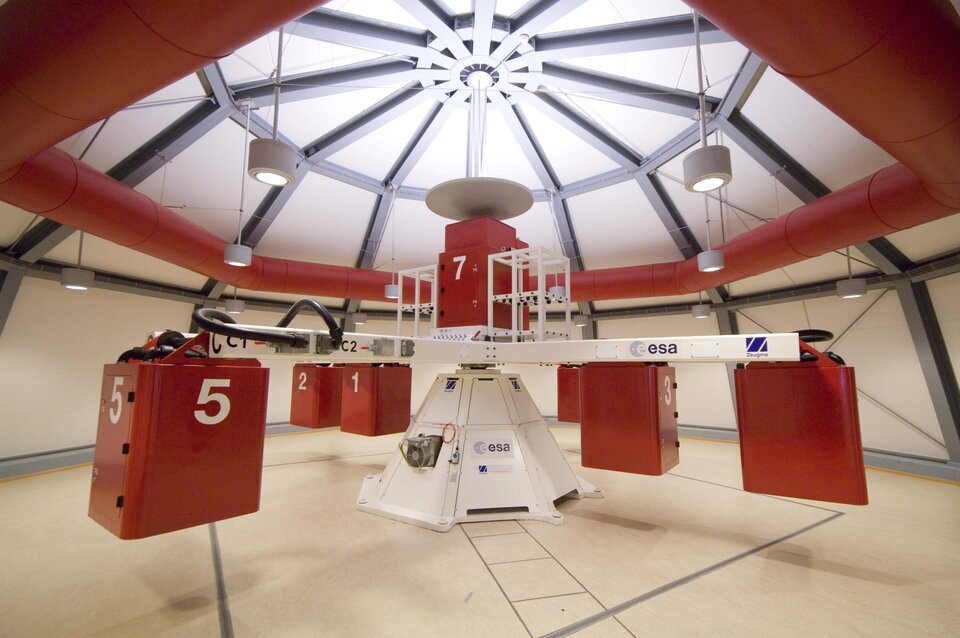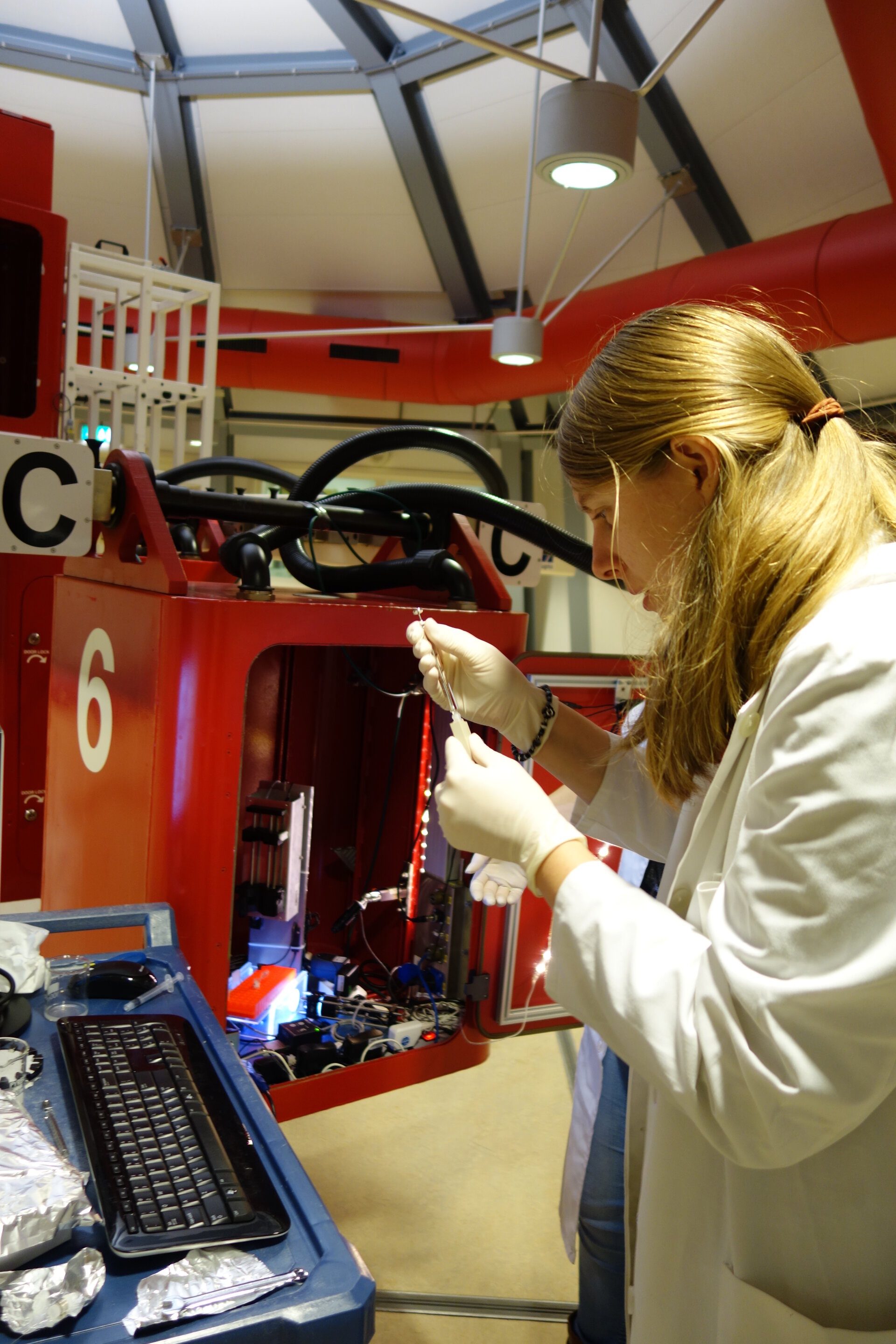ESA wants students to get into a spin
Sometimes it’s good to get into a spin. Particularly if you are a student wanting to run a hyper-gravity experiment. For the eighth year, ESA’s Education Office is open to submissions for its Spin Your Thesis! programme.
Spin Your Thesis! allows students to carry out experiments in hypergravity conditions at ESA’s Large Diameter Centrifuge (LDC). Very different from the desktop centrifuges found in ordinary laboratories, the LDC is a world-class instrument. It is eight metres in diameter, and so large that it is housed in its own hall at ESA’s technical heart (ESTEC), The Netherlands. It can hold an experiment of up to 80kg in mass and spin so fast that it simulates a pull of gravity up to 20 times larger than that experienced at Earth’s surface.
STATUS: closed - ESA Education is not accepting proposals anymore.
Student teams with ideas for experiments should read more about the programme on the Spin Your Thesis! webpage. There is also information about how to apply. Eventually, up to four teams of up to 4 university students from ESA member states or cooperating states* will be chosen later this year to take part in this unique opportunity.
The students chosen to take part in the SYT! programme have the chance to develop important skills that enhance their academic studies and prepare them for careers in the space industry. These include transferable skills such project management, problem solving, and working in international teams.
“It was an opportunity for them to experience something different, to meet other people from other countries and cultures, and to swap ideas. The world of the European Space Agency is very rich. They can help you in many different ways to complete your research.” says Elisa Masi, University of Florence, Italy, who led the HyperMEA team during Spin Your Thesis! 2015.

In addition, the students are helped by experts at the LDC who provide feedback on how to optimise the experiments to get the more out of the studies. “It was a great experience both at personal and professional level because we could interact with ESA technicians and we could learn new techniques and how to work in team,” says Antonella Rocca, Istituto Italiano di Tecnologia, Italy, who was part of Team Osteo, another 2015 Spin Your Thesis! experiment.
Both these teams collected such valuable results that they published their conclusions in professional scientific journals. Opportunities also exist for students to present their findings at international conferences.
“Everything about the programme is run at the highest professional level. In this way we can help teach the students how to take part in the real world of space research. This will help ensure that Europe retains its leading space industry,” says Nigel Savage, programme coordinator for Spin Your Thesis!
Student teams are currently working over the summer to prepare their experiments for the 2016 edition of Spin Your Thesis! From 5 to 16 September, the LDC will be turned over to three teams.

PlanOx from the Centre of Micro-BioRobotics, Italian Institute of Technology in Pisa, Italy, aims to test the response and control of certain stresses in planarian worms when they are exposed to hypergravity conditions.
Achilles from University of Minho and University of Porto, Portugal, will investigate the potential of hypergravity to be used as a tool to develop novel tissue engineering strategies for tendon regeneration.
HypE from the University of Pisa and Scuola Superiore Sant’Anna, Italy. Their project will investigate the effect of hypergravity oncritical cells of the human cardiovascular system.
Apply now!
For your chance to be part of Spin Your Thesis! 2017, go here for the details about how to apply. The submission deadline is 9 October 2016 23:59 CEST with experiments taking place in the fourth quarter of 2017.
For further information please contact at spinyourthesis @ esa.int.
*ESA Member States
Austria, Belgium, Czech Republic, Denmark, Estonia, Finland, France, Germany, Greece, Hungary, Ireland, Italy, Luxembourg, The Netherlands, Norway, Poland, Portugal, Romania, Spain, Sweden, Switzerland and the United Kingdom, Canada (Associate Member).
European Cooperating States
Bulgaria, Cyprus, Lithuania and Malta.
Cooperating States
Latvia, Slovenia and Slovakia.
If you are a citizen of a Cooperating State, you must obtain a letter of endorsement from your national agency stating that you will be financially supported to join this event and attach the document to your application. Further details can be obtained from the ESA Education office upon request.


